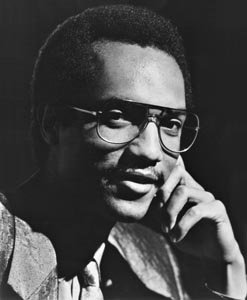
A Mobley Man: Tribute pianist Billy Childs.
A new generation of jazz players pays tribute to Hank Mobley
By Nicky Baxter
TRIBUTE ALBUMS are often dodgy affairs. Well-intentioned notions of revering an artist can sometimes deteriorate into teary-eyed sentimentality or by-the-numbers copies of compositions that have already been given a definitive treatment by the musician in question. At the other extreme are tributes that bludgeon classic cuts beyond recognition under some misguided freedom-of-interpretation act. Blessedly, Grand Central's Tenor Conclave: A Tribute to Hank Mobley (Evidence) avoids such pitfalls.
Mobley (1930-1986) was not on a par with, say, Sonny Rollins, but neither was he just another sideman. The tenor saxophonist was a gifted soloist whose playing was by turns grandly lyrical, tenderly romantic and always irreproachably rhythmic. He spent his formative years with the Jazz Messengers, Max Roach and Miles Davis, proving himself adept at fitting into a variety of musical settings.
Tenor Conclave (the name is derived from one of Mobley's own ensembles) represents something of a supergrouping; Grand Central's lineup includes tenor/soprano saxophonist Ravi Coltrane (son of tenor legend John Coltrane), tenor player Craig Handy, pianist Billy Childs, drummer Cindy Blackman and bassist Dwayne Burno.
"This I Dig of You," culled from Soul Station, the 1960 date generally regarded as Mobley's finest, swings as much as the original. After stating the melodic line, Ravi Coltrane assumes command with a finely crafted solo, demonstrating that he has come a ways from his sometimes overwrought attempts to play like his father. Handy's solo is brief but equally well conceived.
"Dig" is followed by "Hank's Waltz," recorded by Mobley in the mid-1960s. Childs' inaugural musings are succeeded by more unison horn play, this time with Coltrane on soprano. Handy takes the first solo, a thing of beauty that builds in intensity and brims with quirky twists and turns. Initially working his instrument's lower and middle register, Handy gradually rises, expelling a series of short stabbing notes. Ravi leaps in with a molten solo that is equal parts fire and ice. Here as elsewhere the rhythm section proffers low-keyed, sympathetic support.
"Soul Station" and "Tenor Conclave" are the session's high points. Here Grand Central retains the funky spirit of Mobley's original, thanks in large part to Blackman's uncluttered, muscular stickwork and Burno's swaggering bass. On the first chorus, Handy and Coltrane (both on tenor) engage in call-and-response banter. An explosive Blackman strong-arms everyone present with abrupt snaps of snare-drum abetted by stinging cymbal crashes.
"Soul Station" is steeped in tradition, and Handy and Coltrane both clearly revel in plunging themselves into the ancient emotional well that is the blues. Rather than attempting to wow us with glitzy pyrotechnics, they methodically reconnoiter the tune's innards, employing a rich, fat sound made all the meatier when the two musicians tackle the chorus as a team.
With "Tenor Conclave," Grand Central saves its best for last. Mobley's version boasted four horns, including the elder Coltrane's, in a wild free-for-all. This unit doesn't require such numbers to make the sparks fly. Handy and Coltrane alternately exchange feisty but friendly fire, essaying pungent, humor-tinged runs that adroitly showcase the pair's impressive grasp of bop dynamics.
Childs' play is inspired here. Whether launching a pre-emptive solo strike or maintaining the hectic pace with solid comping, he demonstrates why he is in such demand. Meanwhile, Blackman is something like a force of nature. Her playing gathers steam as the tune progresses, and by the time Handy enters the fray, Blackman is exploding all over the place.
Tenor Conclave is a fitting tribute to a musician whose legacy has gone unsung for much too long. Not only does this collaborative effort provide an opportunity to reassess the past via Mobley's blue-collar work, it also serves notice that these young players could prove central to the future of improvisational music.
[ Metro | Metroactive Central | Archives ]
![[Metroactive Music]](/music/gifs/music468.gif)